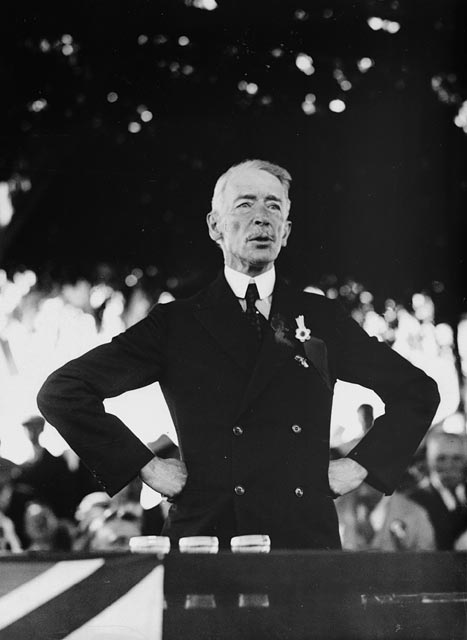- Louis-Alexandre Taschereau
Infobox_President
name = Hon. Louis-Alexandre Taschereau

order = 14thPremier of Quebec
term_start =July 8 ,1920
term_end =June 11 ,1936
predecessor =Lomer Gouin
successor =Adélard Godbout
birth_date = birth date|1867|3|5|mf=y
birth_place =Quebec City
death_date = death date and age|1952|07|06|1867|03|05
death_place = Quebec City
party = Liberal
spouse =
profession =Lawyer
religion =Roman Catholic |Louis-Alexandre Taschereau (
March 5 1867 -July 6 1952 ) was a Premier ofQuebec from 1920 to 1936. He was elected four times, the first in 1900, in the riding of Montmorency. He was also a member of theParti libéral du Québec . He was the first Premier to be born (exactly a week) after Confederation.Born in
Quebec City , the son of Jean-Thomas Taschereau, lawyer and judge at the Supreme Court, and Marie-Louise-Joséphine Caron.He received a law degree from
Université Laval and was admitted to theBarreau du Quebec on July 9, 1889. After entering political life, he served as chief lieutenant in the Liberal government of Sir Lomer Gouin. He practiced his profession in the law firm of Charles Fitzpatrick and Simon-Napoléon Parent. He was also journalist at the "Action Libérale" and president and vice-president of the "Banque d'Economie de Québec".Politics
A member of the Legislative Assembly from 1900 onwards, he served as Lomer Gouin's minister of public works from 1907 to 1919. Elected Premier in 1920, at a time when the
North America n economy began experiencing difficulties that ultimately led to theGreat Depression . He opposed U.S. PresidentFranklin D. Roosevelt 'sNew Deal social democratic policies, saying he couldn't tell if it was fascism or communism. Instead, he vigorously encouraged the development byprivate enterprise of the massive forests and the mineral resources of what had been theUngava Region andNunavik that theParliament of Canada had added to the Province of Quebec.A pioneer in advocating the exploitation of the huge hydraulic potential the waterways of the new Quebec, Taschereau understood the limited capital available in a sparsely populated Canada, and actively tried to bring in American investment to develop Quebec's industrial potential and try to stop mass emigration south of the border.
His policies challenged the traditional agrarian society that the dominance and influence of the
Roman Catholic Church had been able to maintain in Quebec longer than elsewhere in North America. The Liberals of Taschereau were primarily opposed by ultramontane nationalists such asHenri Bourassa , editor of "Le Devoir ", and Roman Catholic priestLionel Groulx , editor of "L'action canadienne-française ". Taschereau introduced a measure in 1930 to create aJew ish board that would have provided for Jewish participation on the highest decision-making educational body in Quebec, the Quebec Council of Public Instruction. Some newspapers saw the move by Taschereau to revamp the confessional school system as an example of an undermining ofChristianity . As a result of the opposition, the Jewish leadership did not push the issue when Taschereau was forced to repeal the Act and submit a compromise which he had the leaders of the Roman Catholic Church examine and approve beforehand. In the resulting bill, Jews were sent back into theProtestant system, and the Jewish board had no power beyond the right to negotiate a deal with the Protestant School board.Another policy of Taschereau involved the alcohol trade. It consisted of providing the government of Quebec with a
monopoly on the sale ofliquor andwine during the era ofProhibition in theUnited States .Taschereau created the Beaux-Arts schools in
Quebec City andMontreal and subsidized scientific and literary works. He was awarded France'sLegion of Honor , Belgium'sOrder of Leopold , and made a Commander of the Order of the Crown of Belgium.In the later years of his premiership, discontent inside the Liberal party became evident. The more "radical" left wing of the party left the Liberals and formed a new party, the
Action libérale nationale .Paul Gouin , the son ofLomer Gouin and grandson ofHonoré Mercier , joined this new party. Later, the Action Libérale Nationale merged with theConservative Party of Quebec to form the "Union Nationale" party under the leadership ofMaurice Duplessis , who had become famous by exposing the Taschereau cabinet's misdeeds before the Accounts Committee of the Legislative Assembly.Premier Taschereau resigned after his brother Antoine admitted to the Accounts Committee that he had deposited the interest on funds belonging to the Legislative Assembly into his personal bank account. With the election of the "Union Nationale" in 1936, the Liberal rule which had lasted for 40 years came to a halt.
The premier served on the boards of a number of major companies, including: Barclays Bank (Canada) Ltd.,
Caisse d'économie ,Molson Bank ,Canadian Investments Funds ,Bank of Montreal ,Royal Trust Co. ,Sun Life Assurance ,Metropolitan Life Assurance Co. ,Liverpool & London & Globe Insurance Co. ,Pioneer Insurance Co. ,Globe Indemnity Co. and theManitoba Liverpool Insurance Co. .On his passing in
Quebec City in 1952, Taschereau was interred in theCimetière Notre-Dame-de-Belmont inSainte-Foy, Quebec .Taschereau's story was documented by author Bernard L. Vigod in his 1986 book, "
Quebec Before Duplessis - The Political Career of Louis-Alexandre Taschereau ".Elections as party leader
He won the 1923 election, 1927 election, 1931 election and 1935 election and resigned in 1936.
See also
*
Politics of Quebec
*List of Quebec general elections
*Timeline of Quebec history External links
* [http://www.assnat.qc.ca/fra/membres/notices/t-u/TASCLA.htm National Assembly biography] fr icon
Wikimedia Foundation. 2010.
